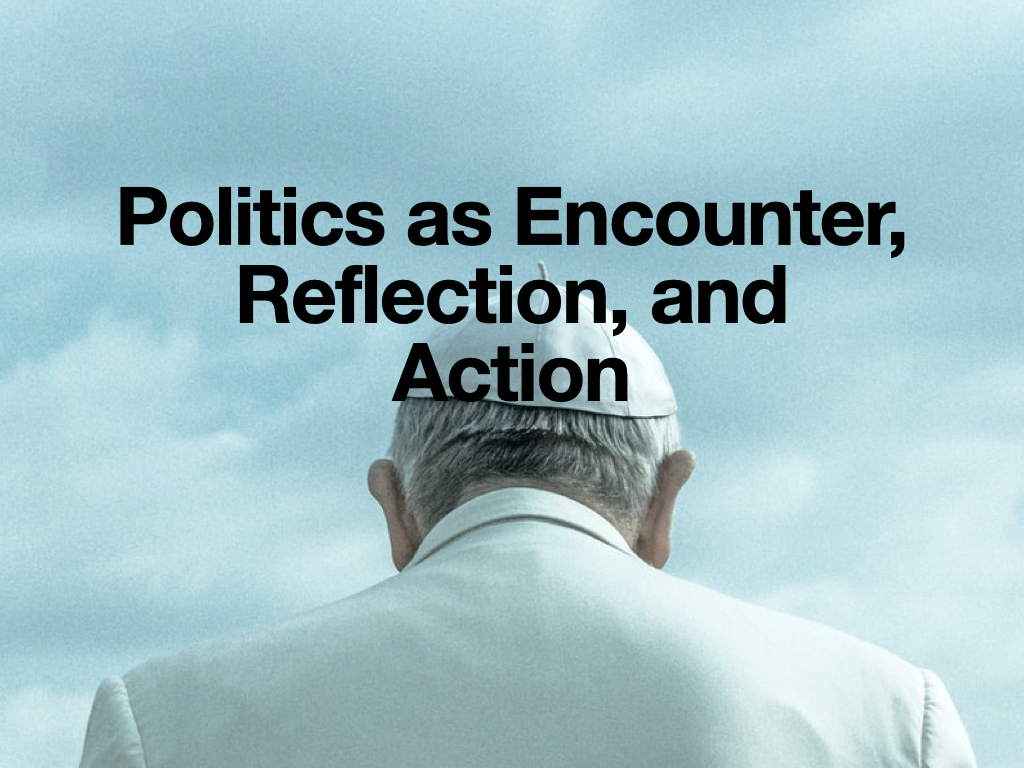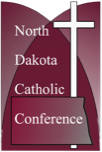
Politics as Encounter, Reflection, and Action
By Christopher Dodson
Executive Director
North Dakota Catholic Conference
May 2022
I recently came across a short address Pope Francis made to representatives of the Chemin Neuf Politics Fraternity. I am not very familiar with the religious community Chemin Neuf and know even less about its Politics Fraternity. According to its website, the fraternity “brings together young people from 18 to 35 years old, from different countries and political backgrounds, who share the same passion for the common good and the poor, and have the desire to be active in politics according to the heart of God.”
The Holy Father told the group that politics for the Christian means encounter, reflection, and action.
Encountering others, of course, is the first act of politics. It is not a singular, internal event. This is true in politics as well. At a minimum, the Pope said, political encounter “consists of being open to others and accepting their differences as part of a respectful dialogue.” Unfortunately, in our often bitterly divided and angry country, achieving that minimum is becoming rare.
For the Christian, however, encounter means something more than respectful interaction with others. The Pope’s words on this call for Christians is worth quoting in whole. He said:
“Because the Gospel demands that we love our enemies (cf. Mt 5:44), we cannot rest content with superficial and formal dialogue, along the lines of the often hostile negotiations between political parties.” Instead, we are called to see political encounters as fraternal encounters, especially with people who disagree with us. That means regarding our dialogue partner as a true brother or sister, a beloved son or daughter of God. The art of encounter, then, begins with changing the way we look at others, with showing them unconditional acceptance and respect. Without such a change of heart, politics often risks turning into a violent confrontation, where people try to impose their own ideas and pursue particular interests over the common good, contrary to the principle that ‘unity prevails over conflict.’”
We should reflect on those words. For Christians, politics should not be viewed as a battle with an enemy. Nor is it an exercise of raw power.
Did you notice that Pope Francis called the act of political encounter an art rather than a skill? Skill is an ability you are born with or learn. Art is creatively applying those skills to something. The Holy Father appears to be saying that true politics is an act of art directed toward the common good rather than a technique, even if that technique leads to what we call political success.
The second aspect of politics, the pope said, is reflection. By this, he did not mean merely thinking about the issue. For the Christian, he said, reflection means viewing the issue according to how it impacts the general good. Politics is not about winning or advancing your own or a particular party or group’s interest. It should be about the common good. The Pope said, “Our own compass for advancing this common project is the Gospel, which brings to the world a profoundly positive vision of humanity as loved by God.”
The third aspect of politics is action. This is classic Pope Francis. He told the group not to sit around and discuss politics, but to go and put words into action. Echoing Evangelii Gaudium, the pope said that realities are more important than ideas. Words and ideas alone can become detached from reality and become ineffectual or dangerous. The “real world” is where the human person — the subject of politics — lives. Encounter occurs there, not in intellectual discussion for sake of intellectual discussion.
It is tempting to think that the danger of ideology without real action occurs only in academia’s ivory towers. It does exist there. Everyone, however, is capable of creating their own towers or bubbles through social media, our choice of news sources, and even our choice of friends. When we create an echo chamber reverberating our own ideas about politics without encountering those with whom we disagree we fall into the trap of ideology without action.
Political action, of course, involves voting, discussion, lobbying, and advocacy. It can sometimes take the form of rallies and protests. When talking about politics to this group, however, Pope Francis identified prayer as part of putting politics into action. Here again, his words are worth quoting entirely. He said:
“Encounter, reflection, action: this is a political programme in the Christian sense. I believe that you are already doing this, especially in your Sunday evening meetings. From joining in prayer to the Father from whom all things proceed, from imitating Jesus Christ, and from listening attentively to the Holy Spirit, your concern for the common good gains a powerful interior incentive. For in this way, politics can be practiced as “the highest form of charity”, as it was defined by Pope Pius XI.”
What We Do
The North Dakota Catholic Conference acts on behalf of the Roman Catholic bishops of North Dakota to respond to public policy issues of concern to the Catholic Church and to educate Catholics and the general public about Catholic social doctrine.

Contact Us
North Dakota Catholic Conference
103 South Third Street, Suite 10
Bismarck, North Dakota
58501
1-888-419-1237
701-223-2519
Contact Us

